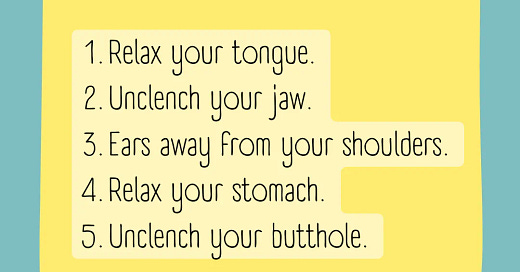Welcome to The Feel Good Life! A newsletter about health, prevention, empathy, and hope. Join me, Dr. Mariana, as I explore all sides of good health and a good life. New here? Get started.
Hello!
A while back I created a video with an easy yet powerful routine to decompress your body from stress in 60 seconds or less. It’s been my most seen post, so I’m bringing it again today—as a reminder of the things your body does when it’s under pressure, how to recognise the signs, and how to release the tension with just five simple movements that will shift your day.
You can practise this 1-minute routine anytime throughout your day, whether at your desk, at home, at work, while cooking, while on a driving pause, during a short walk or your lunch break. It’s always a good time to check in with your body and see what it is asking for.
The easiest no-brainer stress-release routine to save the day.
Many people talk about active pauses (which are great!), but what about the stored tension in your body? You’d be amazed at what 60 seconds can do for your body if you allot some time to actually take these stress-release breathers throughout the day.
How to do it? Let me show you. Just stay calmly where you are, whether sitting, standing, in a meeting, or on a long-haul flight, and take the following steps (explanation below):
RELAX YOUR TONGUE
Most likely, your tongue is more or less glued to your palate (the mouth’s ceiling) right now. Did you just check? This happens out of habit and it’s a sign of muscle tension. When your tongue is tense, mouth, throat and neck muscles will also be tense. Unstick your tongue from the roof of your mouth, take one deep breath IN and…exhale through your mouth. Can you notice the difference? Repeat 3 times in a row. Now - spend the rest of the day occasionally checking in on where your tongue is in your mouth, Your mind will be blown when you realise how most parts of the day, your tongue is stuck all the way up there (as it were).
UNCLENCH YOUR JAW
Put the tips of your fingers on the sides of your mandibles, right behind the softest part of your cheek. Softly press your fingertips in, move them up and down, then in tiny circles. Does it hurt? That’s the masseter muscle you’re pressing. If it hurts, it means it’s been working extra hours, aka. jaw-clenching galore! Did you know that the masseter is considered the strongest muscle in the body? Alongside other small chewing muscles, it can put up to 68 kgs of force into your teeth, even more when we sleep. No wonder we wake up with pain after a jaw-clenching night!
BRING YOUR SHOULDERS DOWN FROM YOUR EARS!
(Common phrase we hear in dancing classes all the time - for good reason!) First, pull your shoulders slightly up towards your ears. Now push them back as if you were moving your wings - as you do this, you’ll notice your spine correcting its posture into a more straight position (this is good). Finally, let your shoulders fall down and away from your ears. A simple move that will instantly release the areas most affected by stress: neck, shoulders and upper back. Can you feel the release? Repeat and see for yourself.
RELAX YOUR STOMACH
Do you feel a shortness of breath when talking fast, giving a speech or trying to explain something for an extended time? This has a lot to do with your diaphragm (the muscle between your abdomen and your chest). This massive muscle has many functions - helping in the breathing and digestive processes being among the most important ones. When you’re not mindful of your eating or speaking habits, your diaphragm tenses up, putting pressure on your abdominal organs affecting their natural function. Take a calm, deep breath. Hold it for a few seconds. Exhale slowly and gently. Repeat this cycle several times and observe if your abdomen becomes less tense as you do it.
UNCLENCH YOUR BUTTHOLE
(Sorry.) Yes, you heard that right. Your perineal and perianal muscles are among the most tense in the body, especially when we sit for long hours. This can put pressure on your pelvic organs, particularly the bowel, resulting in slow intestinal movements and difficult evacuation (hello constipation!). So just relax, take a deep breath and focus on relaxing your butthole, while avoiding…erm, any accidents that this may lead to. ;)
Try this video, save it for later, and repeat as needed. Remind yourself that feeling good on daily basis is possible. It’s a matter of becoming conscious of how you feel, but also how your body feels. Feeling good is not a magic recipe but a personal desire to know and understand yourself better.
And the best way to start? Pay attention to your body and start moving it more. As little and as best as you can. I swear, every little helps.
Do you need a sticky reminder? Save this image below, print it and stick it on your laptop, desk, door or fridge to remind you of decompressing regularly every day.
If a stressful routine is something you really struggle with, you might be relieved to know that there are ways and tools to help you gain control again of your health and your sense of wellbeing. In fact, that’s what I’m here for!
An Anti-Stress Ebook to Help You
If you’re interested in learning more in depth about how your body keeps stress stored and how you can change this, make sure you get a copy of my ebook Don’t Stress It!. It’s the blueprint to help you get better sleep, move more, release the fog, and enjoy your life again.
See you next time!
Love,
Dr. Mariana





